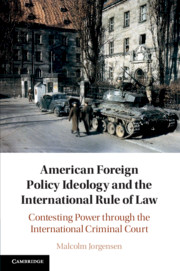 American Foreign Policy Ideology and the International Rule of Law
American Foreign Policy Ideology and the International Rule of Law from Part II - Contesting Global Legal Power through the ICC
Published online by Cambridge University Press: 12 December 2019
Chapter 7 concludes analysis of the ICC with the Obama administration (2008–2016), in which there was a conspicuous ‘reset’ of ICC policy to positive engagement. The United States attended annual meetings for the first time and contributed substantively to negotiations establishing the crime of aggression. There was no formal ‘re-signing’ of the ICC treaty; however, the aggression definition agreed by other states was rejected and the United States continued to deny any prospect of becoming a member of the court. Here, US policy is shown to reflect an amalgam of ideologies but predominantly that of liberalism in both its internationalist and its nationalist form. The consequence was that US re-engagement was always distinct from the legalist position and thus highlighted incompatible legal ideals even as all parties pledged fidelity to the international rule of law.
To save this book to your Kindle, first ensure [email protected] is added to your Approved Personal Document E-mail List under your Personal Document Settings on the Manage Your Content and Devices page of your Amazon account. Then enter the ‘name’ part of your Kindle email address below. Find out more about saving to your Kindle.
Note you can select to save to either the @free.kindle.com or @kindle.com variations. ‘@free.kindle.com’ emails are free but can only be saved to your device when it is connected to wi-fi. ‘@kindle.com’ emails can be delivered even when you are not connected to wi-fi, but note that service fees apply.
Find out more about the Kindle Personal Document Service.
To save content items to your account, please confirm that you agree to abide by our usage policies. If this is the first time you use this feature, you will be asked to authorise Cambridge Core to connect with your account. Find out more about saving content to Dropbox.
To save content items to your account, please confirm that you agree to abide by our usage policies. If this is the first time you use this feature, you will be asked to authorise Cambridge Core to connect with your account. Find out more about saving content to Google Drive.